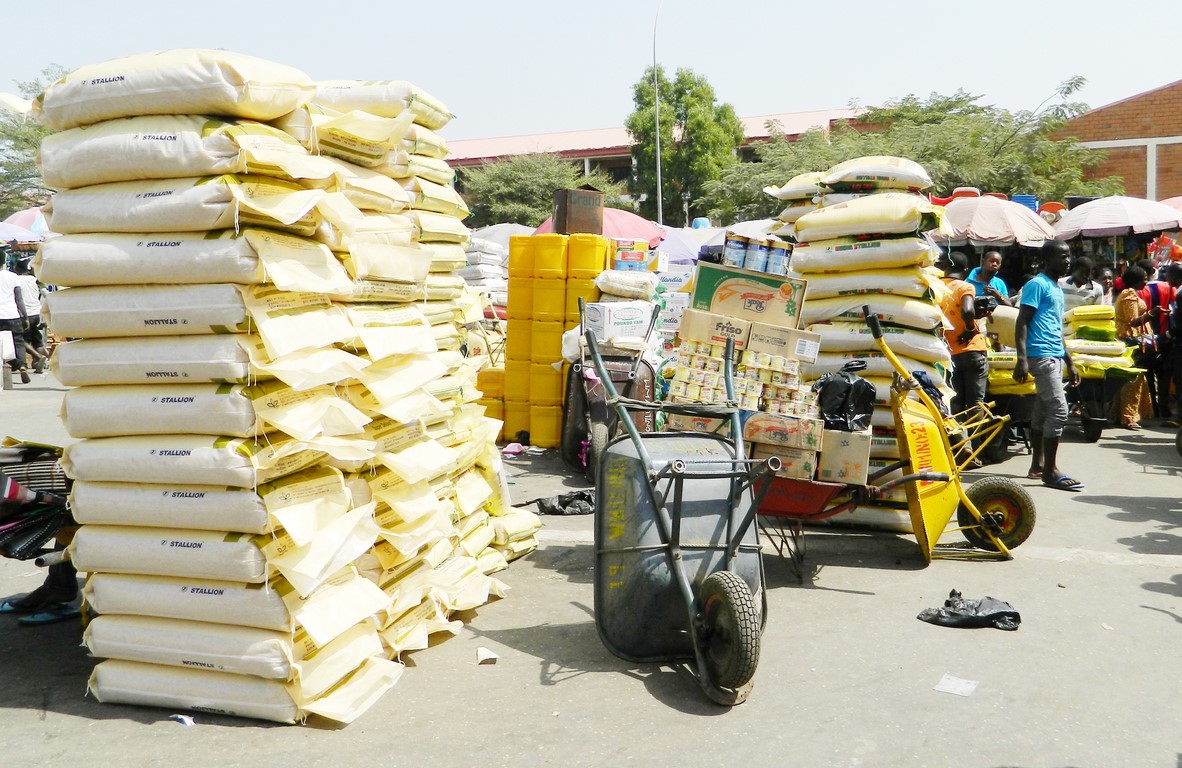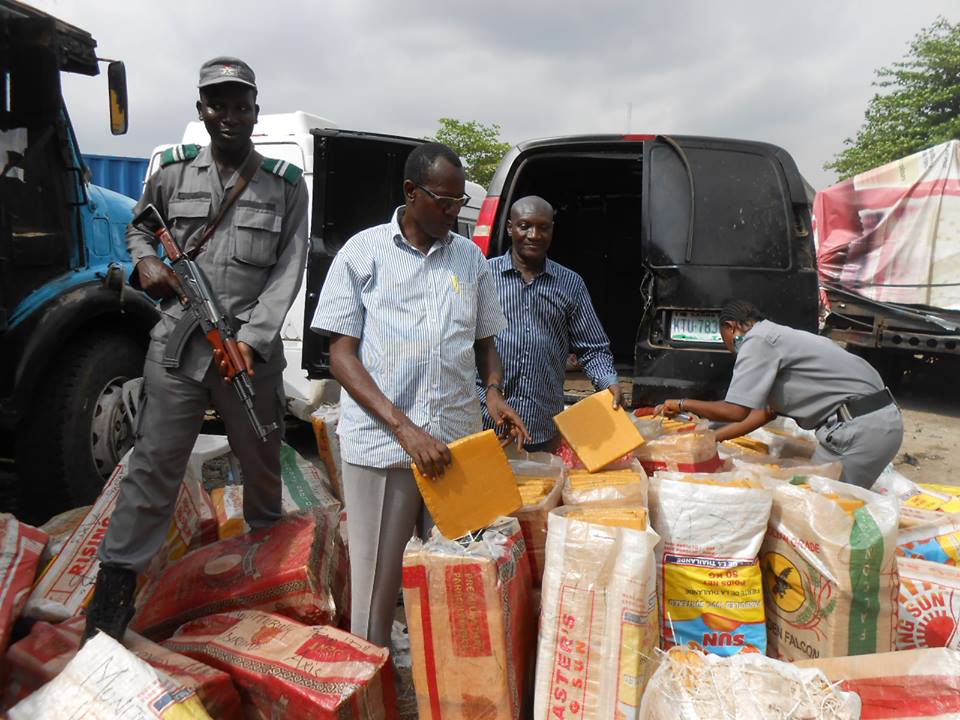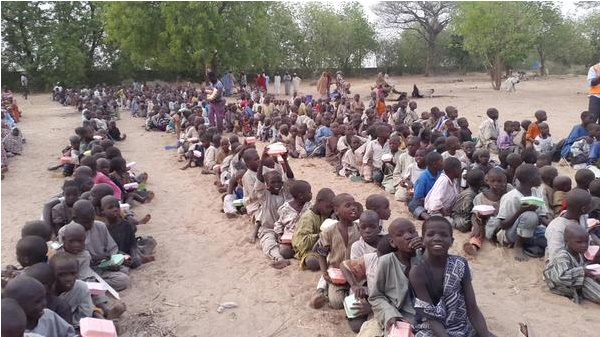Christmas rice in Abuja
The federal government, through the National Emergency Management Agency (NEMA), has distributed thousands of bags of essential food and non-food items to Nigerians in Cameroon, Chad and Niger.
According to a report by the office of the vice president, 12, 332 bags of parboiled rice/rice, 6,084 bags of maize, 6,156 bags of millet, 5,180 bags of granulated sugar, 2,000 bags of salt, 800 bags of semolina, and 4,016 bags of beans were distributed to the displaced Nigerians.
Othe items include 9,800 cartoons of noodles, 1,800 cartoons of powdered milk, 800 cartoons of spaghetti, 2,000 vegetable oil (20 litres), 2,180 cartoons of detergents, 600 kegs of palm oil and 400 cartoons of 3-in-1 tea.
The monthly report for August indicated that non-food items supplied to the camps in the three countries from 2015 to date include medical and non-medical supplies such as antibiotics, anti-fungal, anti-malaria, Anthelmintic, NSAID, non-SAID Analgesics, Antitussives and Antithasmine drugs.
Advertisement
There were also eye drops, anti-diabetic drugs, Antacid drugs, multivitamin, laboratory consumables, blankets, mattresses, mosquito nets, men’s and women’s wears.
In Minawao, Cameroon alone, 48,400 bags and cartoons of non-food items like medium and small mattresses, pillows, mosquito nets, blankets, towels, guinea brocade, nylon mats, plastic plates, cups, spoons and buckets, Omo detergents, washing soaps, bathroom slippers, pampers as well as exercise books pencils and textbooks were distributed to IDPs.
In the report, titled ‘Monthly Report Of Federal Government Actions In The North East States Affected By Boko Haram’, Mariam Masha, senior special assistant to the president on IDPs, stated that the national humanitarian coordination forum (NHCF) was effectively addressing the welfare of IDPs in these areas.
Advertisement
The forum, partnering with critical stakeholders, establishes important intervention mechanisms to check and mitigate the incidence and negative effects of flooding on the IDPs in Borno, Yobe and Bauchi States.
NHCF humanitarian interventions cover areas such as health, nutrition, food security, water, education, protection, sanitation and hygiene across the states affected by insurgency in the northeast region.
MILITARY CONSTRUCT BOREHOLES FOR IDPs
The report showed that the government, “through the bold initiative of the military”, had constructed a temporary school for IDPs in the Bama camp and deployed teachers for a population of over 3,000 children.
Advertisement
The military also provided solar boreholes in Dikwa, Gamboru, Monguno, Marte, Mafe Gwoa, Buni Yadi, Bulla, Allargano and in several other communities in Borno state.
The scale of humanitarian efforts by the military also covers road construction and reconstruction, donation of educational materials to schools as well as rehabilitation of worship centres and markets in Adamawa and Yobe states.
The report also noted that the military, through the office of the national security adviser (ONSA), had formed a working group which is to develop a policy framework and national action plan in preventing and countering violent extremism
WORLD BANK-FG-MILITARY POLIO VACCINATION PLAN
Advertisement
Also, the World Bank and the ministry of health are to collaborate with the military and civilian joint task force (JTF) to vaccinate children in all accessible LGAs in Borno state in support of government’s Polio Response Plan.
NEMA, according to the report, relocated a total of 23,391 IDPs from schools that were initially used as camps to new sites in Bakassi and Dalori IDP camps in Maiduguri.
Advertisement
Similarly, the federal ministry of education provided emergency classroom supplies for learners in Borno communities such as Konduga (675), Bama (2500), Dikwa (500), Damboa (500) and Monguno (500).
The report, which noted the interventions by the presidential initiative for the north-east (PINE), showed that displaced persons in six frontline states also received from PINE, various food items ( rice, millet, guinea corn, maize, iodized salt, vegetable oil and Indomie noodles).
Advertisement
In Michika LGA, 1,780 IDP households benefited from package, consisting of food and non-food items, while 2,000 bags of 25kg rice for IDPs were supplied to Gujiba and Gulani towns all in Adamawa state.
As for Gombe, several bags of food were supplied to the state for the operation safe corridor in the reporting period.
Advertisement
Operation safe corridor (OSC) is a programme set up by the federal government in its war against insurgency in the northeast.
The objective of the programme is equally to enhance government efforts to rehabilitate and re-integrate surrendered and repentant terrorist members in the region.
Add a comment







